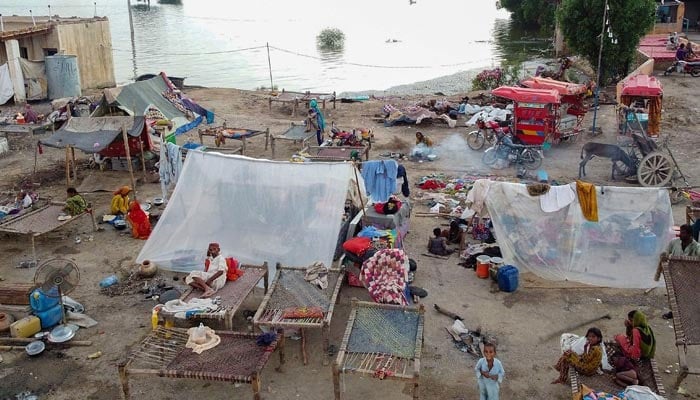UN says flood-hit Pakistan's needs growing with arrival of winter
UN Secretary-General’s Spokesman Stephane Dujarric says even as flood waters recede, more than 20 million people continue to depend on humanitarian aid
UNITED NATIONS: With the arrival of winter, the humanitarian needs of the flood-affected people of Pakistan have intensified and more resources are urgently needed to deal with the situation, a United Nation's (UN) spokesman said on Friday.
In an update on the situation left behind by the devastating August floods, UN Secretary-General spokesman Stephane Dujarric told a regular noon briefing in New York that even as flood waters recede, more than 20 million people continue to depend on humanitarian aid, adding that reconstruction efforts are beginning in some areas.
“To date, in support of the government response, our humanitarian partners have reached more than 4.7 million people with aid since the onset of the flood,” Dujarric told reporters.
Some 2.6 million people have received food assistance, he said. “Our (humanitarian) partners have also helped 125,000 children to resume their education, including through more than 500 temporary learning centres.” However, schools remain inaccessible for more than two million children.
“More resources are urgently needed,” the spokesman said, noting that so far only 23% of the $816 million Floods Response Plan has been received.
Hina Khar calls for enhanced support to countries facing climate-induced disasters
Meanwhile, Minister of State for Foreign Affairs Hina Rabbani Khar stressed the need for a time-responsive, well-funded, and strategically robust emergency response system.
The minister of state, speaking at a high-level pledging event of the Central Emergency Response Fund (CERF), held in hybrid format in New York, also emphasised the impartiality and non-politicisation of such a humanitarian response system.
She was speaking virtually at the event, at the invitation of the United Nations.
Recalling the humanitarian impact of the recent devastating climate-induced floods in Pakistan, Rabbani acknowledged and appreciated the critical assistance provided by the CERF.
She echoed the UN secretary-general’s call for scaled-up funding to CERF, enabling it to assist the developing countries braving climate-induced disasters.
The high-level pledging event was organised at the UN Headquarters in New York to garner international attention and support to the CERF enabling it to respond to emergency humanitarian needs across the globe.
UN Secretary-General Antonio Guterres and UN Under-Secretary-General for Humanitarian Affairs Martin Griffiths inaugurated the event.
The minister of state was also joined by the foreign minister of Finland and Somalia’s special envoy for drought response and humanitarian affairs.
Established in 2005 as the UN global emergency response fund, CERF enables humanitarian responders to deliver life-saving assistance, wherever required.
Pakistan has been a beneficiary and a regular contributor to the Fund. In response to the recent flooding, CERF allocated 10 million USD to Pakistan for life-saving humanitarian activities.
-
Security forces gun down 30 terrorists in multiple IBOs in KP: ISPR
-
MQM-P calls for new province in Sindh
-
US report validates Pakistan military edge over India: PM
-
Banned TTP poses serious threat to Pakistan security: UNSC panel
-
CM Afridi clarifies remarks on by-poll after ECP requests army deployment
-
Dubai sees 3.2m Pakistani passengers in 2025 as airport sets new milestone
-
Security forces kill 23 Indian proxy terrorists in KP's Kurram
-
Pakistan to construct island to boost oil exploration: report












